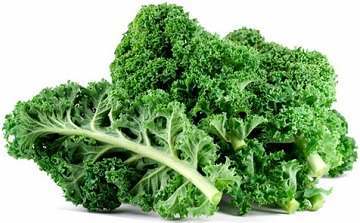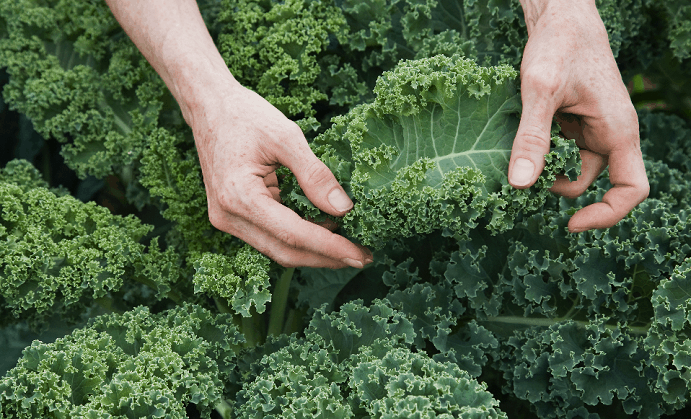Green vegetables, especially kale, contain chemicals called goitrogens that may inhibit absorption of dietary iodine. A decrease in iodine in your body can worsen symptoms of hypothyroidism, a condition where your thyroid gland does not produce enough hormones. The hormones produced by your thyroid gland are essential for regulating your metabolism. Goitrogens are almost completely destroyed during cooking, so avoid eating raw kale in excess with hypothyroidism.
 Hypothyroidism can be caused by iodine deficiency or damage to your thyroid gland. Located in your neck, your thyroid gland may swell during hypothyroidism, a condition called a goiter, from which goitrogens derive their name. Symptoms may include weight gain, cold sensitivity, poor healing, thickened skin, brittle nails and hair, frequent infections, mood disturbances and fatigue. Your doctor will measure levels of thyroid hormones in order to diagnose you with hypothyroidism. Treatment includes medication with synthetic thyroid hormones and careful control of iodine in diet.
Hypothyroidism can be caused by iodine deficiency or damage to your thyroid gland. Located in your neck, your thyroid gland may swell during hypothyroidism, a condition called a goiter, from which goitrogens derive their name. Symptoms may include weight gain, cold sensitivity, poor healing, thickened skin, brittle nails and hair, frequent infections, mood disturbances and fatigue. Your doctor will measure levels of thyroid hormones in order to diagnose you with hypothyroidism. Treatment includes medication with synthetic thyroid hormones and careful control of iodine in diet.
Kale is a cruciferous vegetable (also known as brassicas). Cruciferous veggies include cabbage, kale, broccoli, cauliflower, bok choi, arugula (rocket), turnips and watercress. The connection with the thyroid is that in addition to their healthy compounds, cruciferous vegetables also include isothiocyanates which can inhibit the uptake of iodine by your thyroid – which decreases the amount of thyroid hormone produced and results in ‘underactive thyroid’ or hypothyroidism. Kale and other cruciferous vegetables contain phytochemicals called glucosinolates. These nutrients convert into isothiocyanates in the body when consumed, particularly in their raw form, via the enzyme myrosinase. Isothiocyanates have been found to help detoxify, fight cancer cell growth, and act as antioxidants, so they live up to their powerhouse prominence. However, the metabolites of these compounds compete with iodine for uptake into the thyroid. Thus, excessive intakes of isothiocyanates have been associated with a potential risk to thyroid function, especially in the presence of an iodine or selenium deficiency.
 it’s probably easier to remember that cruciferous veggies like kale contain goitrogens. Goitrogens are substances that suppress the function of the thyroid gland by interfering with iodine uptake, which can, as a result, cause an enlargement of the thyroid, i.e., a goiter. And it looks like goitrogens can suppress thyroid function in susceptible individuals (who are predisposed to low thyroid, or have low iodine intake.
it’s probably easier to remember that cruciferous veggies like kale contain goitrogens. Goitrogens are substances that suppress the function of the thyroid gland by interfering with iodine uptake, which can, as a result, cause an enlargement of the thyroid, i.e., a goiter. And it looks like goitrogens can suppress thyroid function in susceptible individuals (who are predisposed to low thyroid, or have low iodine intake.
Whether you have normal thyroid function or hypothyroidism, there is no benefit for you to avoid or restrict your intake of cruciferous vegetables. Eating cruciferous vegetables is not optional; they have numerous anti-cancer benefits, a high micronutrient to calorie ratio and an association with reduced risk of premature death.An effectively functioning immune system is dependent on their consumption, and these benefits clearly outweigh the risk of a modest decrease in thyroid function, which could only occur if the amount of raw cruciferous intake was at an insanely high level or a person was significantly iodine deficient. Eat one or two servings of cruciferous vegetables daily, in the context of a healthful variety of vegetables, beans, fruit, nuts and seeds; and be sure to get adequate iodine, too.
Do you want to find an effective Thyroid treatment? Check out our top rated Thyroid products










